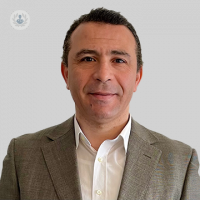Varicose veins: what is the best treatment method?
Written in association with:Expert consultant vascular and endovascular surgeon Mr Mohamed Abdelhamid explores practical strategies for managing varicose veins symptoms, the role of proactive medical consultation, and discusses the latest treatments that offer swift recovery and improved quality of life for individuals affected by varicose veins.

What are varicose veins? How and why do they appear?
To understand his condition, it is necessary to discuss veins. Veins are blood vessels that carry blood from the organs back to the heart and exist throughout the body. Specifically, we are focusing on the veins of the lower leg. These veins have valves that ensure blood flows in one direction, from the leg to the heart.
Varicose veins occur when these valves fail to function properly, causing blood to pool in the leg. There are two systems of veins in each leg: the superficial system under the skin and the deep system between the muscles. Varicose veins affect the superficial veins. Symptoms include pain, swelling, aching, heaviness, and throbbing. Over time, the veins become visibly enlarged under the skin.
When should medical attention be sought?
Varicose veins are generally not life-threatening, but they can significantly affect quality of life. Patients experiencing symptoms that impair their quality of life should consult a GP or be referred to a vascular surgeon, whether through the NHS or privately, to determine if treatment is necessary.
Immediate medical advice is essential if complications arise, such as skin pigmentation, eczema, cellulitis, or thrombophlebitis (where veins become hard, tender, painful, and red). The most severe complication is the development of leg ulcers due to varicose veins.
What are some useful and effective home remedies that can help reduce the severity of the condition?
Over time, symptoms of varicose veins can worsen. However, there are effective strategies to manage them. Wearing compression stockings is crucial for reducing pain and swelling associated with varicose veins. It's important to wear these stockings consistently throughout the day, starting in the morning and removing them before bed, to effectively prevent swelling and alleviate symptoms.
Exercise is beneficial as it promotes muscle movement, helping to pump blood upwards and reduce symptoms. However, prolonged standing or intense exercise can exacerbate symptoms by causing blood to pool in the veins and enlarging them further. Therefore, it's ideal to combine wearing compression stockings with regular, moderate exercise to minimise swelling and prevent symptom progression.
Additionally, when sitting, elevating the legs on a stool can also help reduce swelling and alleviate pain associated with varicose veins. These measures focus on symptom relief rather than providing a cure for varicose veins themselves.
What is the most effective treatment for varicose veins?
The most effective treatment for varicose veins is definitive, curative intervention. Traditional open surgery, such as vein stripping, is now less common. Instead, minimally invasive procedures, often performed as keyhole surgeries, are preferred. These include radiofrequency ablation, laser ablation, mechanical ablation, and a combination approach using mechanical irritation and glue injection to close off veins.
Radiofrequency and laser ablation are particularly effective, providing high rates of success. These procedures are typically performed on an outpatient basis under local anaesthesia or with sedation. Patients can resume normal activities within a day or two, with the ability to walk on the same day as the procedure. These interventions offer varying levels of accuracy and efficacy, aiming to alleviate symptoms and improve quality of life swiftly and effectively.
How can diet and exercise affect the development of varicose veins?
People often ask about diets that might alleviate or worsen varicose vein symptoms. Generally, specific diets don't significantly affect these symptoms. However, certain strategies can help improve them, such as regular exercise combined with wearing compression stockings. It's important to note that prolonged standing or sitting can aggravate symptoms by causing blood to pool in the legs, leading to heaviness, pain, and swelling after exercise.
Patients often report feeling better during exercise but experience discomfort afterwards due to inadequate use of compression stockings. This can result in enlarged veins and persistent swelling. Therefore, while exercise is beneficial, wearing compression stockings concurrently is crucial to manage symptoms effectively.
Regardless of lifestyle changes, seeking medical advice from a vascular surgeon is essential to determine if treatment for varicose veins is necessary. This proactive approach ensures appropriate management and potentially improves long-term outcomes.
If you are suffering from varicose veins and would like to book a consultation with Mr Abdelhamid, simply visit his Top Doctors profile today.


